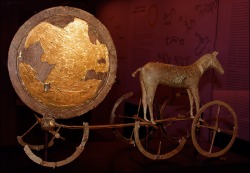Preview on the history of Denmark

From 10,000 to 1500 B.C. , the population of present-day Denmark evolved from a society of hunters and fishers into one of farmers. Called Jutland by the end of the 8th century, its mariners were among the Vikings, or Norsemen, who raided western Europe and the British Isles from the 9th to 11th century.
The country was Christianized by Saint Ansgar and Harald Blaatand (Bluetooth)—the first Christian king—in the 10th century. Harald's son, Sweyn, conquered England in 1013. Sweyn's son, Canute the Great, who reigned from 1014 to 1035, united Denmark, England, and Norway under his rule; the southern tip of Sweden was part of Denmark until the 17th century. On Canute's death, civil war tore apart the country until Waldemar I (1157–1182) reestablished Danish hegemony in the north.
In 1282, the nobles won the Great Charter, and Eric V was forced to share power with parliament and a Council of Nobles. Waldemar IV (1340–1375) restored Danish power, checked only by the Hanseatic League of north German cities allied with ports from Holland to Poland. Denmark, Norway, and Sweden united under the rule of his daughter Margrethe in 1397. But Sweden later achieved autonomy and in 1523, under Gustavus I, independence.
In 1940, Denmark was invaded by the Nazis. King Christian X reluctantly cautioned his fellow Danes to accept the occupation, but there was widespread resistance. Denmark was the only occupied country in World War II to save all its Jews from extermination by smuggling them out of the country.
Beginning in 1944, Denmark's relationship with its territories changed substantially. In that year, Iceland declared its independence from Denmark, ending a union that had existed since 1380. In 1948, the Faroe Islands, which had also belonged to Denmark since 1380, were granted home rule, and in 1953, Greenland officially became a territory of Denmark.
In 2001, the dominant Social-Democrat Party lost to Anders Fogh Rasmussen of the center-right Liberal Party, which formed a coalition with the Conservative Party. Prime Minister Fogh Rasmussen, author of From Socialist to Minimalist State, is a strong proponent of privatization, deregulation, and limited government. Immigration to Denmark fell dramatically in 2002, after Fogh Rasmussen instituted Europe's most restrictive laws for asylum seekers. Because of Denmark's social welfare benefits, the country had become a much-sought-after haven for refugees. In Feb. 2005, Fogh Rasmussen won a second term as prime minister.
Fogh Rasmussen was narrowly elected to a third term in early elections in Nov. 2007. Rasmussen's close win forced him to broaden his coalition government to include the recently formed pro-immigration party, New Alliance.
The country was Christianized by Saint Ansgar and Harald Blaatand (Bluetooth)—the first Christian king—in the 10th century. Harald's son, Sweyn, conquered England in 1013. Sweyn's son, Canute the Great, who reigned from 1014 to 1035, united Denmark, England, and Norway under his rule; the southern tip of Sweden was part of Denmark until the 17th century. On Canute's death, civil war tore apart the country until Waldemar I (1157–1182) reestablished Danish hegemony in the north.
In 1282, the nobles won the Great Charter, and Eric V was forced to share power with parliament and a Council of Nobles. Waldemar IV (1340–1375) restored Danish power, checked only by the Hanseatic League of north German cities allied with ports from Holland to Poland. Denmark, Norway, and Sweden united under the rule of his daughter Margrethe in 1397. But Sweden later achieved autonomy and in 1523, under Gustavus I, independence.
In 1940, Denmark was invaded by the Nazis. King Christian X reluctantly cautioned his fellow Danes to accept the occupation, but there was widespread resistance. Denmark was the only occupied country in World War II to save all its Jews from extermination by smuggling them out of the country.
Beginning in 1944, Denmark's relationship with its territories changed substantially. In that year, Iceland declared its independence from Denmark, ending a union that had existed since 1380. In 1948, the Faroe Islands, which had also belonged to Denmark since 1380, were granted home rule, and in 1953, Greenland officially became a territory of Denmark.
In 2001, the dominant Social-Democrat Party lost to Anders Fogh Rasmussen of the center-right Liberal Party, which formed a coalition with the Conservative Party. Prime Minister Fogh Rasmussen, author of From Socialist to Minimalist State, is a strong proponent of privatization, deregulation, and limited government. Immigration to Denmark fell dramatically in 2002, after Fogh Rasmussen instituted Europe's most restrictive laws for asylum seekers. Because of Denmark's social welfare benefits, the country had become a much-sought-after haven for refugees. In Feb. 2005, Fogh Rasmussen won a second term as prime minister.
Fogh Rasmussen was narrowly elected to a third term in early elections in Nov. 2007. Rasmussen's close win forced him to broaden his coalition government to include the recently formed pro-immigration party, New Alliance.
